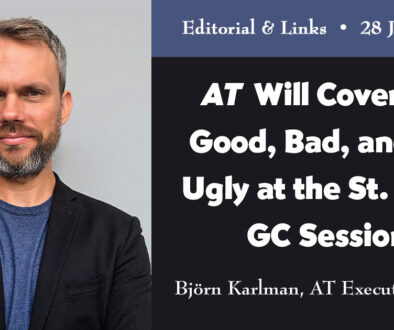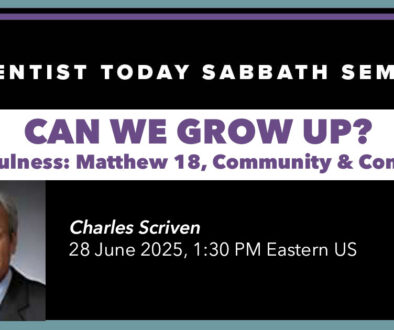ATSS: Mark Carr, “Corporate Adventist Healthcare in the US: How is it ‘Adventist’ and who is it for?”
4 October 2023 |
Adventist healthcare ministry was once considered the “entering wedge” for our church. Other faith-based healthcare ministries were common at the time, with similar goals and objectives: serving the public in our communities with regard to health and well-being, all the while hoping they would join the church. As Adventism went up in flames in Battle Creek, its administration moved to the conservative East coast, its healthcare subculture moved to the liberal West coast, and its business-entrepreneurial subculture developed apace with the rest of American society, including its entering wedge of healthcare.
Society now asks their healthcare facilities to do things unimaginable back in the mid to late 1800s. Healthcare in America became a growth industry, a generator of wealth for many and an equally powerful menace to those without money to pay for it. Corporate healthcare in America is explicitly designed to extract money from sick people. Perhaps it is time to get out of American healthcare now that it is first and foremost a business.
The Adventist Church officially handed over its healthcare ministry to “Adventist” corporations back in the late 1980s. One can reasonably assert that these corporations are not technically Adventist. The church, that is to say, the General Conference, decidedly does not own them. With operating revenue in the 100s of billions, and corporate strategies driven by EBITDA percentage concerns, it is easy to see why critics might say that these corporations have lost their way.
Even if we can make sense of how they remain connected to our church’s past and present, they still must operate in a public space, under the licensure and laws of state and federal governments. Operating under those oversight agencies makes it difficult to reflect Christ and his altruistic ministry to those suffering and marginalized in our communities. The church, it seems (and by that I mean you and me, not the General Conference) can do more to help our healthcare corporations remain connected to their authentic, altruistic, public-centered ministry. But how?
Let’s talk about some of these issues.
Questions for the discussion:
- How can a modern corporation that claims a real connection to Christ and his ministry place the needs of millions of patients over their own needs. Put differently, can healthcare really be altruistic? Again, put differently, how many patients cared for in Adventist hospitals file bankruptcy every year? And is that our fault or theirs?
- Exactly how are Adventist healthcare corporations deemed “Adventist”? Who gets to decide if they are or are not?
- Who are they? AdventHealth, Loma Linda University Health, Kettering Health, Adventist Health, Adventist HealthCare
- What are the natural tensions that occur in faith-based ministries with regard to the connection to the leadership of their faith? Whether Adventist, Baptist, Lutheran, Catholic, or Jewish, what issues are problematic for relations with authority figures in their church? Can Adventists learn anything from the Catholic Church’s American culture wars as seen in the US Conference of Catholic Bishops’ responses to Catholic healthcare corporations?
- What are the tensions that occur in serving the public, a public that seeks assistance in death, gender transitioning services, justifiable abortion services, and an overall disposition to live longer than we would naturally?
Teacher:
Mark F. Carr, MDiv., PhD., is the Senior Director of Ethics for the Providence Health healthcare corporation in Alaska, where the mission to extend the healing ministry of Christ guides a century-and-a-half vocational tradition of the Sisters of Providence. He formerly pastored several Seventh-day Adventist Churches in Alaska prior to receiving his PhD in Religious Ethics at the University of Virginia. He devoted sixteen years to Loma Linda University’s School of Religion, where he led the MA program in biomedical and clinical ethics, as well as being the theological co-director for the Center for Christian Bioethics. After a short time at Kettering College in Ohio, he returned to his beloved Alaska, where he enjoys his job, family, flying, fishing, and fat tire bike riding in the winter.
Moderator:
Raj Attiken is retired president of the Ohio Conference, now an adjunct professor at Kettering College.
How to join:
One-click link: https://us06web.zoom.us/j/89961664763
Passcode: LUKE (all caps)
ATSS starting time depends on where you are. If you’re on the west coast of the United States, it’ll be 10:30 AM. On the east coast, 1:30 PM. Times in Europe, Africa and elsewhere will vary with local time changes. Please double-check the correct time where you live.
The class is intended to last about 2 hours, though the conversation often continues to 4 PM (Eastern time).
About our class:
- The AT Sabbath Seminar is intended to be a courteous forum. We discuss and ask questions politely. We don’t accuse, get angry, put people down, or judge the state of their salvation.
- Stick to the topic in both comments and chat discussion.
- Make your comments and questions short—don’t dominate.
- Keep your microphones muted unless you are called upon to make your comment or ask your question.
- Indicate your interest in speaking by raising your electronic hand—under the “reactions” button.
- Please use your name when you sign in! Not your phone number, not your initials. This will help us differentiate you from unwelcome guests who want to disrupt us. You can set your name after signing on by clicking on the 3 dots next to your picture, which drops down a menu.
We look forward to getting acquainted with you!
YouTube channel:
You can see all of our previous ATSS recordings here.
Coming up:
- Tom deBruin
- Pilira Zapita (Newbold)
- Olive Hemmings (WAU)
- Tihomir Lazic




